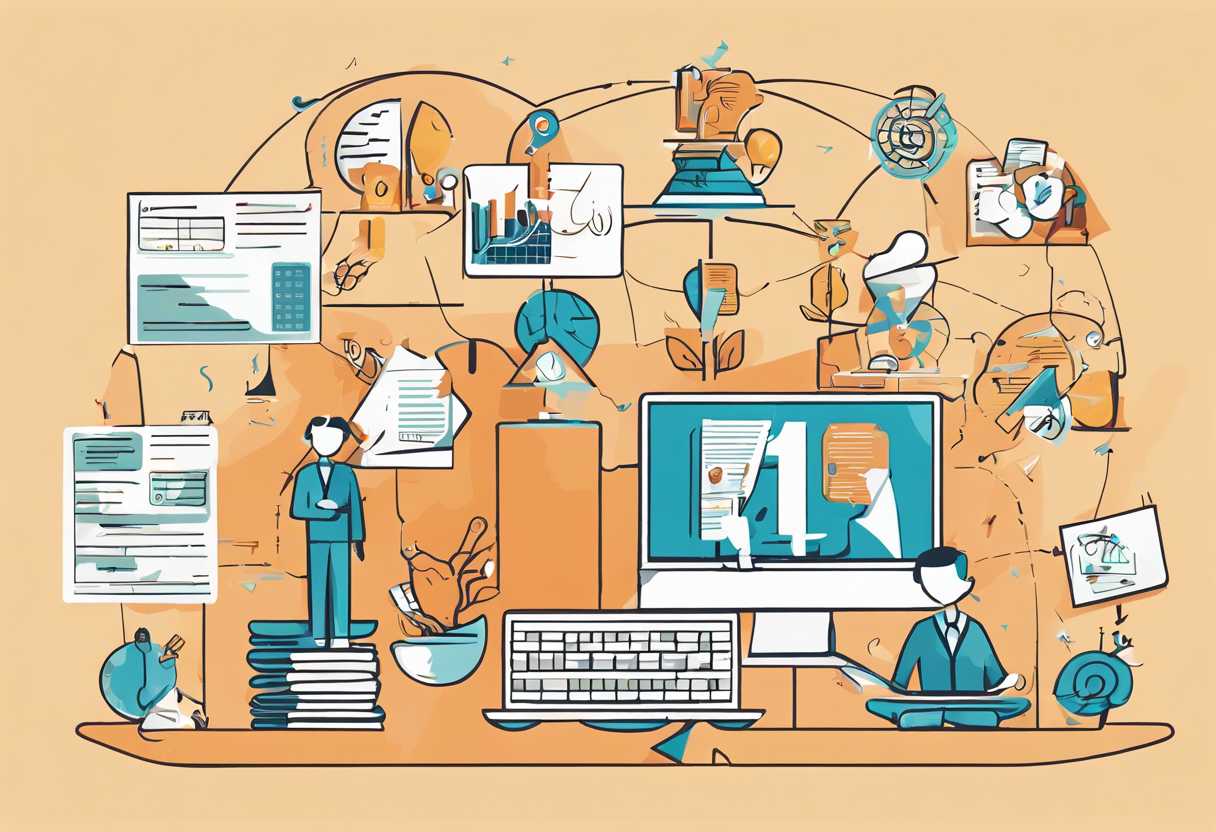Are you ready to take your project management skills to the next level in 2023? As the business landscape continues to evolve, mastering essential soft skills is crucial for successful project delivery. In this blog post, we will explore 14 crucial project management soft skills that will be essential for the year ahead. From mastering communication and collaboration to navigating change and uncertainty, we will delve into the art of adaptability, emotional intelligence, problem-solving, critical thinking, time management, and organization. Join us as we uncover the key to effective leadership and team management, and learn how to build resilience for successful project delivery in 2023. Whether you’re a seasoned project manager or just starting out in the field, these soft skills will be essential for staying ahead in the competitive project management landscape. Let’s dive in and explore the essential soft skills that will set you apart in 2023.
Mastering Communication and Collaboration: Essential Soft Skills for Project Management in 2023
The Importance of Soft Skills in Project Management
Effective project management goes beyond technical skills and knowledge. In 2023, the ability to communicate and collaborate effectively is more crucial than ever. Soft skills such as communication, teamwork, and leadership are essential for successful project management. These skills enable project managers to build strong relationships, resolve conflicts, and motivate team members, ultimately leading to project success.
Effective Communication Strategies for Project Managers
Communication is at the core of project management. Project managers must be able to convey information clearly, listen actively, and provide feedback effectively. *Active listening* is a key communication skill that allows project managers to understand the needs and concerns of team members. Additionally, utilizing *empathetic communication* can help project managers build trust and rapport with their teams, leading to better collaboration and productivity.
Collaboration Techniques for Project Success
Collaboration is essential for project success, as it allows team members to work together towards a common goal. Project managers can foster collaboration by creating a *positive team culture* that encourages open communication and idea sharing. *Effective delegation* is also crucial for collaboration, as it allows project managers to distribute tasks based on team members’ strengths and expertise, leading to efficient project execution.

The Art of Adaptability: Navigating Change and Uncertainty in Project Management
The Importance of Adaptability in Project Management
Adaptability is a crucial skill for project managers, especially in today’s fast-paced and ever-changing business environment. Project managers must be able to quickly adjust to unexpected changes, whether it’s a shift in project scope, a new stakeholder requirement, or a sudden budget cut. Adaptability allows project managers to remain agile and responsive, ensuring that projects stay on track and deliver the desired results.
Strategies for Cultivating Adaptability
There are several strategies project managers can employ to cultivate adaptability within their teams. Effective communication is key, as it allows team members to stay informed and aligned, even when facing unexpected challenges. Flexibility is also important, as it enables project managers to adjust timelines, resources, and priorities as needed. Additionally, encouraging a growth mindset among team members can foster a culture of adaptability, where individuals are open to learning and embracing change.
The Benefits of Adaptability in Project Management
Embracing adaptability in project management offers numerous benefits. It allows teams to respond quickly to market shifts, seize new opportunities, and mitigate risks. Moreover, adaptable project managers are better equipped to build resilient teams that can thrive in the face of uncertainty. Ultimately, adaptability is a competitive advantage that can set a project and its team apart in a dynamic and unpredictable business landscape.

Emotional Intelligence: The Key to Effective Leadership and Team Management in 2023
The Importance of Emotional Intelligence in Leadership
Emotional intelligence, or EQ, is a crucial trait for effective leadership in 2023. Leaders with high EQ are able to understand and manage their own emotions, as well as those of their team members. This allows them to build strong relationships, communicate effectively, and make sound decisions. Research has shown that leaders with high EQ are more successful in motivating and inspiring their teams, leading to higher productivity and job satisfaction.
Developing Emotional Intelligence in Leaders
Developing emotional intelligence is a process that requires self-awareness, self-regulation, empathy, and social skills. Leaders can improve their EQ through self-reflection, seeking feedback from others, and practicing mindfulness and emotional regulation techniques. Training and coaching programs can also be effective in helping leaders develop their emotional intelligence. By investing in the development of EQ, organizations can cultivate a more positive and productive work environment.
The Impact of Emotional Intelligence on Team Management
Emotional intelligence is also essential for effective team management. Leaders with high EQ are better equipped to understand the needs and motivations of their team members, leading to improved collaboration and teamwork. They are also more adept at resolving conflicts and managing stress within the team. By fostering a culture of emotional intelligence within the team, leaders can create a more cohesive and high-performing work environment.
Problem-Solving and Critical Thinking: Building Resilience in Project Management
The Importance of Problem-Solving in Project Management
Problem-solving is a crucial skill in project management, as it allows professionals to identify, analyze, and solve complex issues that may arise during the course of a project. By honing their problem-solving abilities, project managers can navigate unexpected challenges and keep their projects on track. Effective problem-solving also fosters resilience, as it enables professionals to adapt to changing circumstances and overcome obstacles.
Developing Critical Thinking Skills
Critical thinking is another essential component of resilience in project management. This skill involves the ability to objectively analyze and evaluate information, identify underlying assumptions, and make informed decisions. By cultivating critical thinking skills, project managers can approach problems with a clear and rational mindset, leading to more effective solutions and a greater capacity for resilience.
Strategies for Building Resilience
There are several strategies that project managers can employ to build resilience through problem-solving and critical thinking. These include encouraging open communication and collaboration among team members, fostering a culture of continuous learning and improvement, and embracing a proactive approach to addressing challenges before they escalate. By implementing these strategies, project managers can create a resilient project management environment that is better equipped to handle adversity and achieve success.
Time Management and Organization: Essential Soft Skills for Successful Project Delivery in 2023
The Importance of Time Management in Project Delivery
Time management is crucial for successful project delivery in 2023. With tight deadlines and high expectations, project managers and team members must be able to prioritize tasks, set realistic timelines, and efficiently allocate resources. Effective time management not only ensures that projects are completed on time, but also reduces stress and improves overall productivity.
Key Strategies for Effective Time Management
One key strategy for effective time management is prioritizing tasks. By identifying the most critical tasks and allocating time and resources accordingly, project teams can ensure that the most important work is completed first. Additionally, setting clear deadlines and creating a realistic schedule are essential for keeping projects on track. Utilizing time management tools and techniques can also help streamline processes and improve efficiency.
The Role of Organization in Project Delivery
Organization is another essential soft skill for successful project delivery. A well-organized project team can easily access necessary information, track progress, and identify potential roadblocks. Effective organization also facilitates clear communication and collaboration among team members, leading to smoother project execution.
One key aspect of organization is document management. Ensuring that all project-related documents are properly organized and easily accessible can save valuable time and prevent confusion. Additionally, establishing clear processes and workflows can help streamline project execution and minimize errors.
Conclusion
As we look ahead to 2023, it’s clear that mastering the 14 crucial project management soft skills will be essential for success in the dynamic and fast-paced business environment. From communication and collaboration to adaptability, emotional intelligence, problem-solving, critical thinking, time management, and organization, these skills will empower project managers to lead their teams effectively and deliver successful projects.
By honing these soft skills, project managers can navigate change and uncertainty with confidence, build resilient teams, and drive project success. As we continue to embrace new technologies, methodologies, and global challenges, the ability to master these soft skills will be more critical than ever.
So, whether you’re a seasoned project manager or just starting your career in project management, investing in developing these crucial soft skills will undoubtedly set you apart and propel your career forward in 2023 and beyond.
Stay ahead of the curve by continuously refining and enhancing your soft skills, and remember that the journey to becoming a proficient project manager is ongoing. Embrace the opportunities to learn, grow, and adapt, and you’ll be well-equipped to thrive in the ever-evolving landscape of project management.
Are you ready to take your project management soft skills to the next level in 2023? Start by implementing the insights and strategies shared in this blog post, and watch as your effectiveness and impact as a project manager soar to new heights.

